Travel trailers are an excellent choice for adventure seekers and nomads, but how long do travel trailers last? This is one of the most common questions asked by RV enthusiasts. The lifespan of a travel trailer depends on several factors, including build quality, maintenance, and usage. Let’s dive into the details to help you get the most out of your travel trailer. Maintaining your travel trailer is essential to ensure it lasts for years and provides countless adventures. Travel trailer maintenance not only protects your investment but also ensures safety and performance. From regular inspections to proper storage, adopting the right methods can significantly extend the life of your RV. Below, we discuss various approaches and highlight the best way to maintain your travel trailer effectively.
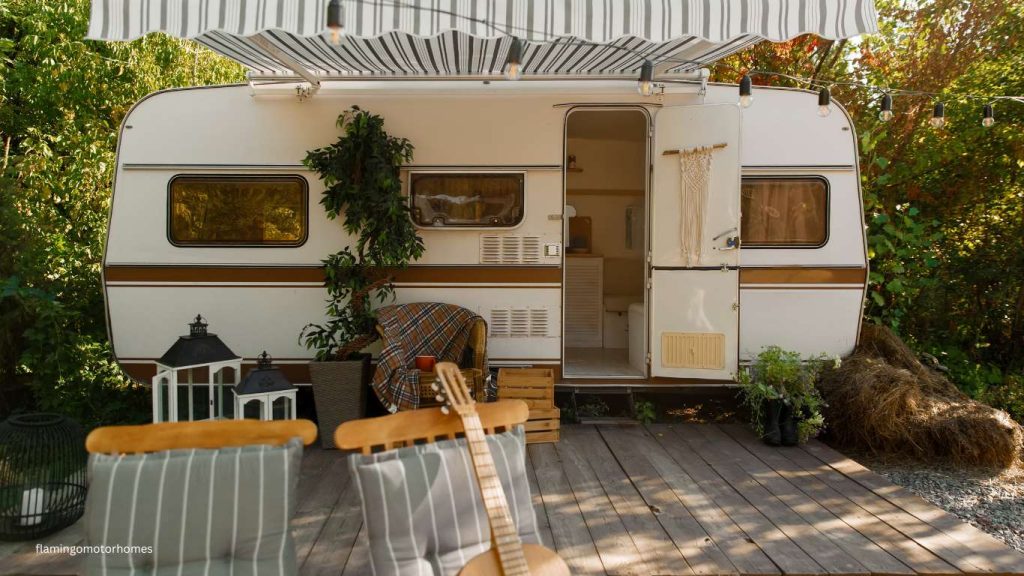
Average Lifespan of a Travel Trailer
Most travel trailers last between 10 to 15 years, but with proper care, some can even reach 20 years or more. The key to extending their life lies in regular maintenance and responsible usage.
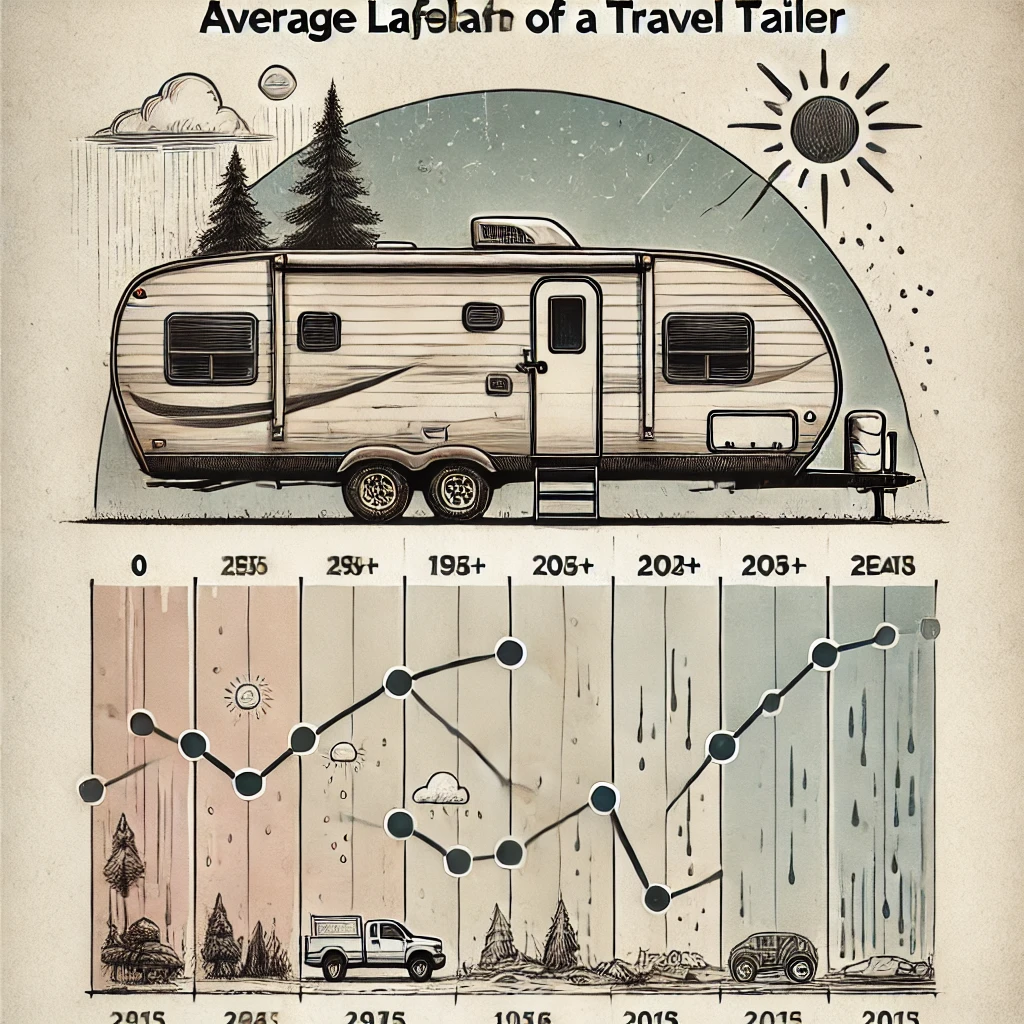
Factors Affecting the Lifespan of a Travel Trailer
Following are the factors that effect the life span of travel trailers:
1. Build Quality
High-quality travel trailers built by reputable manufacturers generally last longer. Look for features like durable materials, weather-resistant coatings, and sturdy frames.
2. Maintenance
Routine maintenance is crucial. This includes:
- Inspecting and resealing roofs and windows.
- Regularly servicing appliances.
- Checking for leaks and rust.
3. Usage
Frequent use or harsh conditions can wear down a trailer faster. On the other hand, trailers used seasonally and stored properly in the off-season tend to last longer.
4. Storage Conditions
Storing your trailer in a covered area or using an RV cover protects it from harmful elements like UV rays, rain, and snow, which can cause significant wear over time.

Signs Your Travel Trailer Needs Replacement
- Persistent Leaks: Water damage is one of the biggest threats to your trailer’s longevity.
- Structural Issues: Cracks in the frame or walls signal the end is near.
- Outdated Features: Old appliances and interiors may become more costly to repair than replace.
How to Prolong the Life of Your Travel Trailer
1. Regular Inspections
Conduct a thorough inspection every season to identify and fix minor issues before they escalate.
2. Proper Cleaning
Clean your trailer after every trip. Pay attention to areas prone to dirt buildup, like the roof and undercarriage.
3. Invest in Upgrades
Modernize your travel trailer with upgrades like solar panels, better insulation, or advanced appliances to enhance functionality and extend usability.
| Tool/Equipment | Use/Function | Pro Tip |
|---|
| Tire Pressure Gauge | Measures and monitors tire pressure to prevent blowouts. | Opt for a digital gauge for more accurate readings. |
| Torque Wrench | Tightens lug nuts to the proper torque specifications. | Check your trailer’s manual for the correct torque settings. |
| Multimeter | Tests electrical systems and batteries for faults. | Ensure it can test for both AC and DC voltages. |
| Grease Gun | Lubricates wheel bearings and other moving parts. | Use high-temperature grease suitable for RV wheel bearings. |
| Water Tank Cleaner | Cleans and sanitizes fresh water tanks and lines. | Use a specialized RV-safe cleaner for the best results. |
| Sealant (RV-Specific) | Reseals roof, windows, and doors to prevent leaks. | Always keep a tube of Dicor or similar brand handy for quick repairs. |
| Bubble Level | Ensures your trailer is level during setup. | Use a digital level for easier and more precise readings. |
| RV Jack or Stabilizers | Lifts and stabilizes the trailer for maintenance tasks. | Always use on solid ground or with jack pads for safety. |
| Propane Leak Detector | Checks for leaks in the propane system. | Regularly test with a soap-and-water solution if a detector isn’t available. |
| Awning Cleaner | Cleans and protects your trailer’s awning fabric. | Choose a UV-resistant cleaner to extend the life of your awning. |
| Rust Preventative Spray | Protects the trailer’s frame and undercarriage from rust. | Apply after thoroughly cleaning the area for better adhesion. |
| Roof Patch Kit | Repairs small holes or tears in the roof. | Match the patch material to your roof type (rubber, fiberglass, etc.). |
| RV Wash and Wax | Cleans and protects the exterior finish. | Use a soft brush and microfiber cloth to prevent scratches. |
| Slide-Out Lubricant | Keeps slide-out mechanisms smooth and prevents sticking. | Spray on tracks and wipe off excess to avoid buildup. |
| Fire Extinguisher | Provides emergency fire safety. | Ensure it is rated for Class B and C fires (flammable liquids and gases). |
| Baking Soda and Vinegar | Natural cleaning agents for water tanks and surfaces. | Use baking soda to clean and vinegar to sanitize tanks. |
| Caulking Gun | Applies sealant evenly to cracks and joints. | Practice on a scrap surface for smooth application. |
| Ladder (Collapsible) | Provides access to the roof for inspections and cleaning. | Choose a lightweight aluminum ladder for easy storage. |
| Tool Kit (General) | Includes wrenches, screwdrivers, pliers, and hammers. | Opt for a compact, RV-specific tool kit for convenience. |
| Surge Protector | Protects your RV’s electrical system from power surges. | Invest in one with an LED display for easy monitoring. |
Effective Methods to Maintain Your Travel Trailer’s Lifespan
Travel trailers are a significant investment, and proper care can extend their lifespan, ensuring you enjoy them for years. Below are proven methods to maintain your travel trailer, along with the best method to prioritize.
1. Regular Inspections
Frequent inspections allow you to identify and address potential issues early.
What to Inspect:
- Roof and Seals: Look for cracks, leaks, or wear.
- Tires: Check for proper inflation and tread wear.
- Frame and Undercarriage: Look for rust or damage.
- Electrical Systems: Test batteries, lights, and connections.
Why It’s Important:
Prevents small problems from escalating into costly repairs.
2. Routine Cleaning
A clean travel trailer is not just aesthetically pleasing—it’s essential for longevity.
What to Clean:
- Exterior: Remove dirt, grime, and debris to prevent corrosion.
- Interior: Vacuum and sanitize to avoid mold and mildew.
- Water Systems: Flush and sanitize tanks to maintain water quality.
Pro Tip:
Wash and wax the exterior every 3-6 months to protect it from UV rays and weather damage.
3. Proper Tire Maintenance
Tires are critical for safe towing and a smooth ride.
How to Maintain Tires:
- Check pressure before every trip.
- Rotate tires every 6,000–8,000 miles.
- Store the trailer with tire covers to protect from UV damage.
Why It’s Important:
Ensures safe driving and prevents premature tire failure.
4. Protect Against Water Damage
Water damage is a leading cause of expensive repairs in travel trailers.
How to Prevent It:
- Inspect and reseal roof seams, windows, and doors annually.
- Use a breathable RV cover during storage.
- Check for leaks after heavy rain or snow.
Why It’s Important:
Keeps the structure intact and prevents costly mold remediation.
5. Follow a Maintenance Schedule
Consistency is key to maintaining your travel trailer.
Essential Tasks:
- Grease wheel bearings annually or every 10,000 miles.
- Service brakes and suspension every 12 months.
- Test appliances and propane systems before each trip.
Pro Tip:
Keep a maintenance log to track completed tasks and upcoming services.
6. Proper Storage
How you store your trailer significantly impacts its lifespan.
Best Practices:
- Store indoors or under a covered area to shield from elements.
- Use an RV cover to protect against dirt, UV rays, and moisture.
- Disconnect batteries and store them in a cool, dry place during the off-season.
7. Lubricate Moving Parts
Friction can cause wear and tear on your travel trailer’s moving parts.
What to Lubricate:
- Slide-outs
- Hitch components
- Door hinges and locks
Why It’s Important:
Prevents mechanical failures and ensures smooth operation.
8. Upgrade and Modernize
Modern upgrades can keep your travel trailer functional and enjoyable.
What to Upgrade:
- Install solar panels to reduce dependency on hookups.
- Upgrade insulation for better temperature control.
- Replace outdated appliances for efficiency and safety.
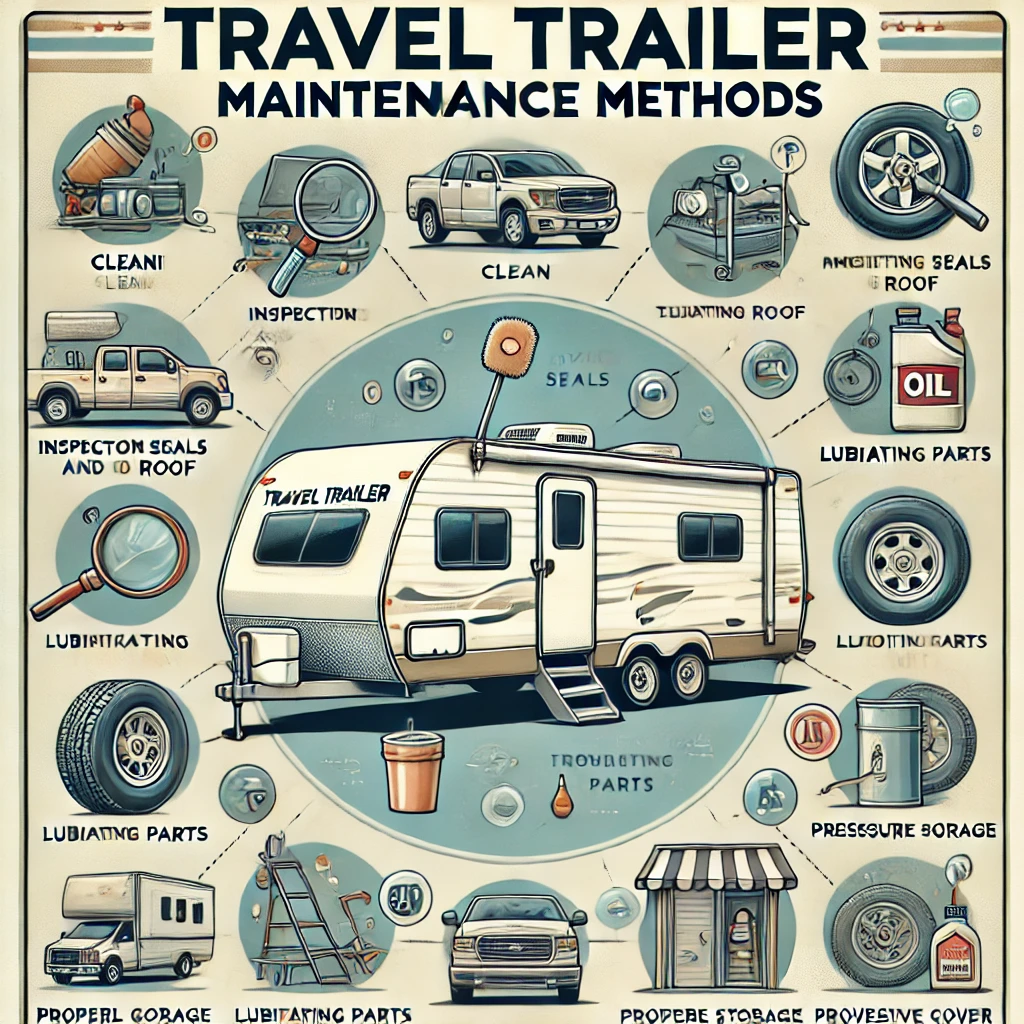
The Best Method: Comprehensive Preventative Maintenance
Among all these methods, preventative maintenance is the most effective for extending your travel trailer’s lifespan. It includes regular inspections, cleaning, servicing, and timely repairs. By proactively addressing issues, you avoid costly breakdowns and ensure a safe, comfortable experience.

Why Preventative Maintenance Is the Best:
- Reduces long-term repair costs.
- Improves safety and functionality.
- Preserves the resale value of your trailer.
| Maintenance Task | Frequency | Why It’s Important | Pro Tip |
|---|
| Inspect Roof and Seals | Every 3-6 months | Prevents leaks and water damage. | Use RV-specific sealant to address cracks or gaps. |
| Check Tire Pressure and Tread | Before every trip | Ensures safe driving and prevents blowouts. | Invest in a tire pressure monitoring system (TPMS). |
| Grease Wheel Bearings | Annually or every 10K miles | Prevents wheel failure and reduces friction. | Use high-quality RV wheel bearing grease for smoother performance. |
| Test Electrical Systems | Before every trip | Keeps appliances and lights working safely. | Carry a multimeter to check for electrical issues. |
| Service Brakes | Every 6-12 months | Ensures reliable stopping power. | Pay attention to unusual noises or pulling while braking. |
| Sanitize Water Systems | Every 3-6 months | Removes bacteria and ensures clean water. | Use a water tank cleaner or bleach solution, then flush thoroughly. |
| Clean and Inspect Slide-Outs | Every 3 months | Prevents sticking and damage. | Lubricate slide-out tracks and clean seals regularly. |
| Check Propane System | Monthly | Prevents leaks and ensures safety. | Use a propane leak detector or soap solution to test connections. |
| Inspect Underbelly and Frame | Every 6 months | Identifies rust or structural issues. | Apply rust-preventative spray to protect exposed metal parts. |
| Clean and Reseal Windows | Annually | Prevents drafts and water intrusion. | Use a silicone-based sealant for long-lasting protection. |
| Inspect Roof-Mounted Appliances | Every 6 months | Ensures proper functioning. | Clean vents and check seals around air conditioners and fans. |
| Wash and Wax Exterior | Every 3-6 months | Protects paint and prevents corrosion. | Use RV-safe soap and wax for a polished, weather-resistant finish. |
| Test Battery Health | Monthly | Avoids power issues during trips. | Keep batteries charged and clean terminals with a baking soda solution. |
| Lubricate Moving Parts | Every 3-6 months | Keeps doors, hitches, and steps smooth. | Use an RV-specific lubricant on hinges, jacks, and stabilizers. |
| Inspect Awnings | Before every trip | Prevents tearing and mechanical failure. | Clean and allow the awning to dry fully before storing. |
| Check Safety Equipment | Monthly | Ensures readiness in emergencies. | Test smoke detectors, carbon monoxide detectors, and fire extinguishers. |
A Well-Maintained Trailer for Lifelong Adventures
Maintaining your travel trailer requires a mix of regular inspections, proper cleaning, and consistent care. While all methods are essential, adopting a preventative maintenance approach ensures your trailer stays road-ready and problem-free for years.
Making Your Travel Trailer Last Longer
The lifespan of a travel trailer depends on how well it is cared for. By focusing on regular maintenance, mindful usage, and proper storage, you can ensure your trailer lasts well beyond the average lifespan. So, with a little effort, your travel trailer can continue being your home on wheels for many years to come.
Common Mistakes When Using a Travel Trailer?
Travel trailers are an incredible way to explore the open road, but they require care and proper handling. Whether you’re a seasoned traveler or a newbie, avoiding common travel trailer mistakes is essential to ensure safety, comfort, and longevity for your RV. Let’s explore the pitfalls to watch out for and how to avoid them.
Top Common Travel Trailer Mistakes
1. Overloading the Trailer
One of the most frequent errors is exceeding the Gross Vehicle Weight Rating (GVWR). Overloading can lead to:
- Increased wear on tires and axles.
- Unsafe handling and reduced braking efficiency.
How to Avoid: Always weigh your trailer at a scale and distribute weight evenly. Use a checklist to ensure you pack only what’s necessary.
2. Ignoring Tire Maintenance
Neglecting tire care can lead to blowouts or dangerous driving conditions.
Common Issues Include:
- Using underinflated or overinflated tires.
- Failing to check for signs of wear and tear.
How to Avoid: Inspect tires regularly for cracks, proper pressure, and tread depth. Replace them according to the manufacturer’s guidelines.
3. Forgetting to Secure Items Inside
Many travelers forget to secure items inside the trailer, leading to:
- Broken belongings.
- Damage to interior walls or furniture during transit.
How to Avoid: Use non-slip mats, straps, and storage bins to keep items in place while driving.
4. Not Leveling the Trailer Properly
Parking on an uneven surface without leveling your trailer can:
- Damage appliances like the refrigerator.
- Cause discomfort inside the trailer.
How to Avoid: Always carry leveling blocks and a bubble level to ensure a stable setup.
5. Skipping Regular Maintenance
Routine maintenance is essential to keep your travel trailer in top condition. Common oversights include:
- Failing to check roof seals for leaks.
- Neglecting to service brakes or bearings.
How to Avoid: Stick to a maintenance schedule and inspect your trailer thoroughly before each trip.
6. Misjudging Trailer Height or Width
Hitting overpasses, tree branches, or tight spaces is a costly mistake.
How to Avoid: Know your trailer’s dimensions and use a GPS designed for RVs to avoid restricted routes.
7. Rushing the Hitching and Unhitching Process
Improperly hitching your travel trailer can lead to dangerous towing conditions.
How to Avoid: Double-check all connections, including the hitch ball, safety chains, and electrical wiring. Take your time and follow a step-by-step checklist.
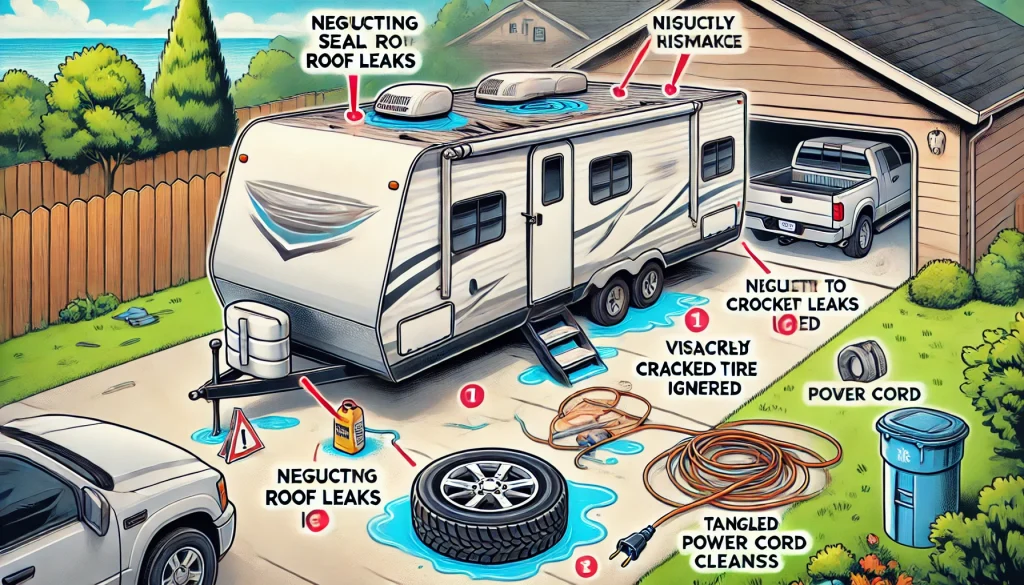
Bonus Tips to Avoid Travel Trailer Mistakes
- Practice Towing: Get comfortable with towing and backing up your trailer in a safe, open space before hitting the road.
- Mind the Weather: Always check weather forecasts and avoid driving in high winds or heavy rain.
- Learn the Basics: Familiarize yourself with your trailer’s systems, like water tanks, propane, and electrical connections.
Avoiding Travel Trailer Mistakes for a Smooth Journey
By steering clear of these common travel trailer mistakes, you can enjoy stress-free adventures and extend the life of your RV. With preparation, attention to detail, and a commitment to maintenance, you’ll have a safer and more enjoyable experience on the road.
Pro Tip: Keep a checklist for packing, hitching, and maintenance to ensure you never overlook the essentials.
Would you like a downloadable checklist or more specific advice? Let me know in the comments!
How to Maintain Different Classes of Travel Trailers
Maintaining your travel trailer is essential to ensure it stays in great shape and provides years of memorable adventures. But not all travel trailers are the same! Understanding the specific maintenance needs of different classes of travel trailers will help you care for your RV like a pro.
Classifications of Travel Trailers and Their Maintenance Needs
1. Conventional Travel Trailers
These are standard towable RVs available in various sizes, featuring full amenities.
Key Maintenance Tips
- Roof Care: Inspect for leaks and reseal the roof annually to prevent water damage.
- Electrical Systems: Test outlets, lights, and battery levels regularly.
- Tires: Monitor tire pressure and rotate them for even wear.
- Appliances: Clean and service appliances like refrigerators and furnaces before every season.
2. Fifth-Wheel Trailers
Fifth-wheels are larger and feature a unique hitching system, making them popular for spacious living.
Key Maintenance Tips
- Hitch System: Lubricate the hitch pin and inspect it for wear. Ensure secure connections during every trip.
- Suspension and Brakes: Fifth-wheels are heavy, so check suspension components and brake pads regularly.
- Slide-Outs: Clean slide-out seals and lubricate mechanisms to prevent sticking or misalignment.
3. Teardrop Trailers
Compact and lightweight, teardrop trailers are ideal for minimalist travelers.
Key Maintenance Tips
- Seals and Windows: Inspect seals to prevent leaks since their compact design makes them more vulnerable to water intrusion.
- Exterior Cleaning: Keep the exterior clean to prevent rust and corrosion.
- Solar Panels (if equipped): Check connections and clean panels for optimal energy efficiency.
4. Pop-Up Campers
Pop-ups are foldable trailers, great for easy storage and towing.
Key Maintenance Tips
- Canvas Care: Clean the canvas regularly and treat it with waterproofing spray to extend its life.
- Lift System: Lubricate the lift system to ensure smooth operation.
- Frame and Undercarriage: Inspect for rust or damage after each trip.
5. Toy Haulers
Designed for adventurers, toy haulers feature a garage space for recreational gear.
Key Maintenance Tips
- Garage Area: Clean the flooring and check tie-downs for wear.
- Weight Distribution: Ensure balanced loading to avoid putting strain on axles and tires.
- Fuel Systems (if equipped): Regularly inspect built-in fuel tanks and lines for leaks.
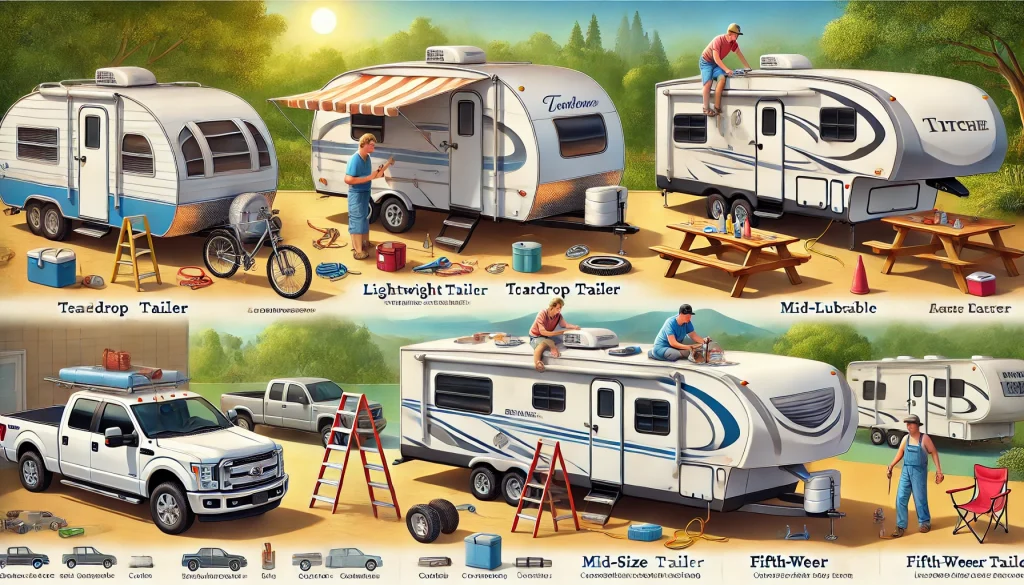
General Maintenance Tips for All Travel Trailer Classes
1. Inspect Roof and Seals
Leaks are a common enemy. Check and reseal roof edges, windows, and doors annually.
2. Service the Bearings
Wheel bearings should be greased at least once a year or every 10,000 miles.
3. Monitor Water Systems
Flush and sanitize the water tanks regularly to avoid bacteria buildup. Ensure no leaks in plumbing lines.
4. Maintain the Battery
Clean battery terminals and check charge levels often, especially before extended trips.
5. Protect During Storage
Use an RV cover or store your trailer indoors to shield it from harsh weather conditions.
Pro Tips for Efficient Travel Trailer Maintenance
- Keep a maintenance log for all services and repairs.
- Use RV-specific cleaning products to avoid damaging surfaces.
- Schedule a professional inspection annually to catch issues early.
Tailored Care for Every Travel Trailer Class
Proper maintenance is the secret to making your travel trailer last. Whether you own a compact teardrop or a spacious fifth-wheel, following the right maintenance practices ensures safety, comfort, and durability.
Pro Tip: Invest in a roadside assistance plan for extra peace of mind during your travels.
Do you want more detailed checklists for each trailer class or recommendations for reliable maintenance tools? Let us know in the comments!
Best Travel Trailer Brands to Buy and Which to Avoid
Choosing the right travel trailer can make or break your RV experience. With so many brands in the market, it’s crucial to invest in one known for quality, reliability, and great customer service. At the same time, there are brands with consistent complaints about poor build quality or customer support, which you might want to avoid. Let’s break down the best travel trailer brands and the ones you should approach with caution.
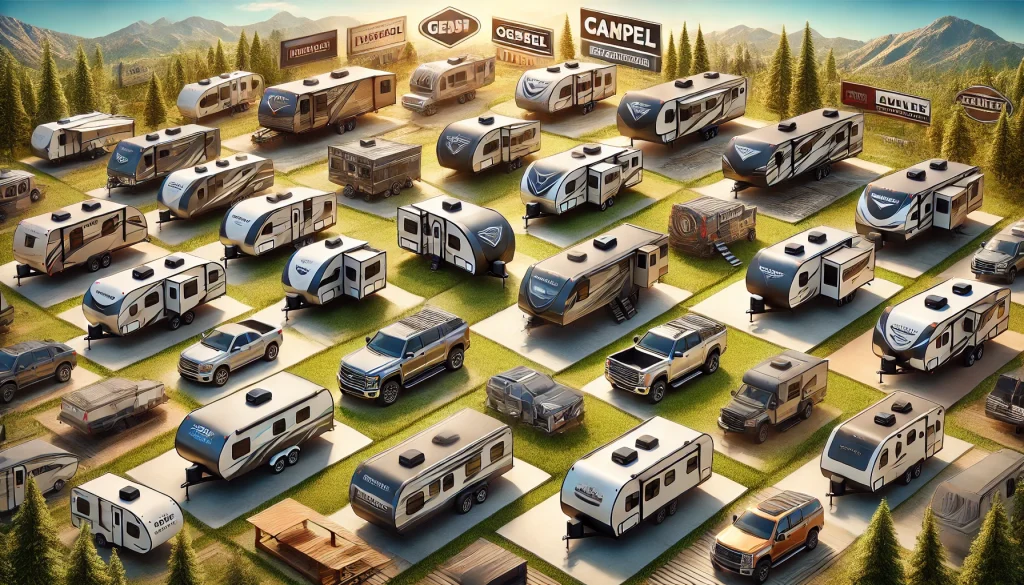
Top Travel Trailer Brands You Can Trust
1. Airstream
Why Buy:
- Iconic design and aluminum construction for durability.
- High resale value due to its premium reputation.
- Excellent build quality and luxury interiors.
Ideal For: Travelers seeking long-lasting, stylish, and luxurious travel trailers.
2. Grand Design
Why Buy:
- Focus on quality control with detailed pre-delivery inspections.
- Great customer service and warranty policies.
- Popular models like Imagine and Reflection offer spacious, feature-rich designs.
Ideal For: Families and full-time RVers who need reliability and comfort.
3. Jayco
Why Buy:
- Strong reputation for affordability without compromising quality.
- Wide range of models for beginners and seasoned RVers.
- Exceptional warranties, including the industry-leading 2-year limited warranty.
Ideal For: New RVers or budget-conscious buyers looking for a dependable trailer.
4. Winnebago
Why Buy:
- Long-standing reputation for innovative designs and top-tier craftsmanship.
- Lightweight models like the Micro Minnie are perfect for smaller tow vehicles.
- Excellent support and service network.
Ideal For: Adventurers who want compact, easy-to-tow options.
5. Forest River
Why Buy:
- Extensive lineup, from budget-friendly models to high-end options.
- Popular series like Rockwood and Flagstaff are known for their reliability.
- Great value for the price with modern features.
Ideal For: Buyers looking for versatile options across various price points.
Travel Trailer Brands You Should Hesitate to Buy From
1. Keystone
Why Hesitate:
- While some Keystone models are great, others have reports of inconsistent quality control.
- Common complaints include interior wear and tear, plumbing issues, and poor customer service.
Better Option: Grand Design or Jayco offers more reliable alternatives in a similar price range.
2. Coachmen
Why Hesitate:
- Budget-friendly but often criticized for poor insulation, water leaks, and fragile interiors.
- May not withstand long-term use or harsh conditions.
Better Option: Forest River or Winnebago provides more durability in comparable models.
3. Gulf Stream
Why Hesitate:
- Mixed reviews regarding build quality and durability.
- Limited service and support network compared to competitors.
Better Option: Jayco or Airstream offers better long-term reliability.
4. Heartland
Why Hesitate:
- Frequent complaints about electrical and structural issues in mid-range models.
- Customer service can be hit or miss.
Better Option: Consider brands like Grand Design for better overall quality and support.
How to Choose the Right Travel Trailer Brand
1. Research Reviews
Check online forums, social media groups, and owner reviews for firsthand experiences.
2. Inspect Before Buying
Always inspect the build quality in person. Look for details like sturdy cabinetry, clean caulking, and smooth slide-out operation.
3. Check Warranty and Support
A strong warranty is a good indicator of the manufacturer’s confidence in their product. Ensure the brand offers good after-sales support.
Invest Wisely for a Better RV Experience
The best travel trailer brands like Airstream, Grand Design, Jayco, and Winnebago offer quality, reliability, and peace of mind. On the other hand, brands like Keystone, Coachmen, and Gulf Stream may not meet your expectations, especially for long-term use.
Don’t just focus on price—consider durability, after-sales service, and resale value to make a well-rounded decision.
Would you like recommendations for specific models or a side-by-side comparison? Let me know in the comments!
More related details will be available on Flamingo Motorhomes

